Despite His Legendary Career, Bruce Willis Never Did This Genre – Here’s Why!
OPINION: This article may contain commentary which reflects the author's opinion.
Bruce Willis built a career on being Hollywood’s quintessential action hero, a charismatic everyman who could crack a joke even while walking barefoot across broken glass. Over nearly four decades and more than 100 movies, he dominated action, comedy, drama, science fiction, thrillers, and even dipped his toes into horror. Yet despite this staggering range, one classic genre eluded him entirely: the traditional Western.
Bruce Willis: Master of Many Genres
Born on March 19, 1955, Willis shot to fame with the comedy-drama series Moonlighting (1985–1989), showcasing his quick wit and magnetic charm. His role as John McClane in Die Hard (1988) redefined the modern action hero, while performances in Pulp Fiction (1994), The Sixth Sense (1999), and Looper (2012) cemented his status across multiple genres.
His resume includes:
-
Action: Die Hard, The Fifth Element
-
Comedy: Look Who’s Talking, The Whole Nine Yards
-
Drama: Moonlighting, Nobody’s Fool
-
Thriller: The Sixth Sense, Mercury Rising
-
Science Fiction: 12 Monkeys, Looper
-
Crime: Pulp Fiction, Sin City
-
Horror-Adjacent: The Sixth Sense, Death Becomes Her
He even dabbled in music, releasing albums like The Return of Bruno (1987), and lent his voice to animated projects. But when it comes to the American Old West — cowboys, dusty frontier towns, duels at high noon — Willis never truly saddled up.
The Near Misses: Western-Inspired But Not True Westerns
While Willis never starred in a traditional Western, he brushed close with the genre:
-
Last Man Standing (1996): A neo-Western action-crime film set during Prohibition. Though featuring gunslingers and lawless towns, it’s more Yojimbo-meets-noir than classic John Wayne territory.
-
Sunset (1988): A comedic drama set in 1929 Hollywood, involving real-life Western legend Wyatt Earp. However, the setting is far removed from the rugged frontier landscapes that define the Western genre.
Despite these Western “shadows,” Willis never portrayed a traditional cowboy or frontier lawman in a classic Western setting — a surprising omission for an actor whose rugged charisma would have seemed tailor-made for the genre.
Why the Western Eluded Willis
The Western genre had faded from mainstream Hollywood prominence by the time Willis’s star rose in the late 1980s. As the industry shifted toward action blockbusters and high-concept thrillers, there were simply fewer traditional Westerns being made. In many ways, Willis became the face of a new kind of American hero — urban, flawed, resourceful — rather than the stoic cowboy of old.
A Legacy Without Spurs — And Still Legendary
Although Bruce Willis never strapped on spurs or rode off into a dusty sunset, his legacy remains unshakable. He redefined heroism for modern audiences, moving beyond genre limitations and capturing the spirit of resilience, humor, and humanity. In a career that spanned nearly every cinematic frontier, the Old West may be the only frontier he never needed to conquer.
And somehow, that makes his story even more fitting: Bruce Willis didn’t need a six-shooter to become an American legend. He just needed a smirk, a one-liner, and an unbreakable will to survive.



